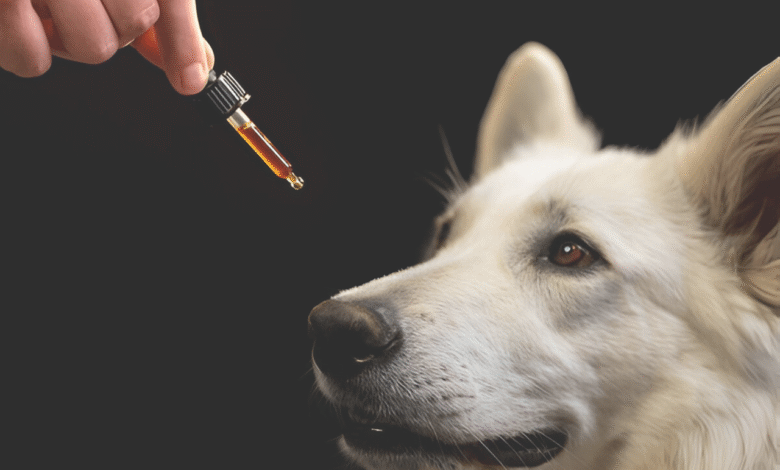
CBD for Pets: Is It Safe, and Does It Work?
CBD for pets Discover if it's safe & effective for your dog or cat. Vet-approved facts on benefits, dosage & risks. Learn more.
CBD for pets has become a hot topic among pet owners looking for natural ways to support their furry friends’ health. Derived from hemp, CBD (cannabidiol) is a non-psychoactive compound that interacts with the endocannabinoid system in both humans and animals. Many pet parents turn to CBD oil for dogs and cats to help with issues like anxiety, pain, and seizures, but questions remain about its safety and effectiveness. With growing interest and mixed opinions from veterinarians, it’s important to separate fact from hype when considering CBD for pets.
While some studies and anecdotal reports suggest that CBD for Pets benefit, the lack of extensive research and FDA regulation raises concerns. Pet owners want to know: Does CBD actually work for conditions like arthritis or separation anxiety? Are there any risks or side effects? This article explores the science behind CBD for Pets, its potential benefits, safety considerations, and expert recommendations to help you make an informed decision for your four-legged companion.
CBD for Pets
What Is CBD, and How Does It Work for Pets?
CBD, or cannabidiol, is a non-psychoactive compound derived from the hemp plant. Unlike THC (tetrahydrocannabinol), it does not produce a “high.” Both humans and animals have an endocannabinoid system (ECS), which regulates functions like pain, mood, appetite, and immune response. When CBD interacts with the ECS, it may help maintain balance in the body. Research suggests that CBD for pets may influence receptors in the ECS, potentially reducing inflammation, anxiety, and seizures. While studies are still limited, early findings indicate that CBD oil for dogs could help with conditions like osteoarthritis and epilepsy.
Potential Benefits of CBD for Pets
One of the most common reasons pet owners try CBD is for pain relief. Studies on dogs with arthritis show that CBD oil may reduce discomfort and improve mobility. Another key benefit is anxiety reduction, particularly in pets with separation anxiety or noise phobias (like fear of thunderstorms or fireworks). Additionally, CBD for pets has shown promise in managing seizures. The FDA has approved a CBD-based drug (Epidiolex) for humans with epilepsy, and some veterinarians report similar benefits in dogs. Other potential uses include appetite stimulation, anti-nausea effects, and skin condition support. However, results can vary depending on the pet’s size, breed, and health condition.
Is CBD Safe for Pets? Understanding the Risks
While CBD is generally considered safe, it’s not without risks. Some pets may experience side effects such as drowsiness, dry mouth, or diarrhea. High doses of CBD oil for dogs and cats could also lead to elevated liver enzymes, so regular monitoring by a vet is essential. Another concern is product quality. Since the CBD pet industry is largely unregulated, some products may contain contaminants or incorrect CBD concentrations. Always choose third-party tested, organic CBD oil specifically formulated for pets. Avoid products with THC, as even small amounts can be toxic to animals.
What Do Veterinarians Say About CBD for Pets?
Cautious Optimism About Potential Benefits
Many vets acknowledge CBD’s possible benefits for pain relief, anxiety, and seizures in pets, based on early research and anecdotal reports. However, they emphasize that more clinical studies are needed to confirm long-term efficacy and safety. Most recommend CBD only as a complementary therapy, not a replacement for traditional treatments.
Concerns About Lack of Regulation & Quality Control
Veterinarians warn that the unregulated CBD market poses risks, with some products containing incorrect dosages or harmful contaminants. They advise pet owners to choose third-party tested, veterinary-recommended brands and avoid products with undisclosed ingredients or unrealistic claims.
Legal Restrictions Limit Professional Guidance
Due to federal and state regulations, many vets are legally restricted from prescribing CBD, even in states where it’s legal. Some may provide off-the-record advice, but pet owners should check their local laws and seek vets experienced with cannabinoid therapy for proper guidance.
Dosage & Monitoring Are Critical
Vets stress that proper dosing is essential, typically starting with 1-2mg per 10 lbs of body weight. They recommend slowly increasing the dose while monitoring for side effects like lethargy, digestive upset, or liver enzyme changes, especially in long-term use.
How to Choose the Best CBD for Pets
Verify Third-Party Lab Testing
Always select CBD products with a Certificate of Analysis (COA) from an independent lab. This confirms the product’s potency, purity, and safety, ensuring it’s free from harmful contaminants like pesticides or heavy metals. Reputable brands make these lab reports easily accessible.
Choose the Right CBD Spectrum
Opt for broad-spectrum CBD (with multiple cannabinoids but zero THC) or CBD isolate (pure CBD) for pets. Avoid full-spectrum products with THC, as even trace amounts may be harmful. The entourage effect from broad-spectrum can enhance benefits safely.
Check the Ingredients List
Look for organic, all-natural ingredients with no artificial additives. Avoid products with unnecessary fillers, preservatives, or flavorings that could irritate your pet. Carrier oils like MCT oil are ideal for better absorption.
Consider Your Pet’s Size & Dosage
Dosing depends on your pet’s weight and condition—typically 1-2mg of CBD per 10 pounds. Start with the lowest dose and gradually increase if needed. Liquid CBD oils allow precise dosing, while CBD treats offer convenience but less control.
Select a Reputable Brand
Choose established brands with transparent sourcing, positive reviews, and veterinary endorsements. Avoid companies making unrealistic medical claims. Look for pet-specific formulas rather than human CBD products, which may contain unsafe ingredients.
Pick the Right Delivery Method
CBD oils/tinctures (fastest absorption) are best for quick relief, while CBD treats/chews work well for picky eaters. For skin issues, topical CBD balms may help. Match the format to your pet’s needs and preferences.
Consult Your Veterinarian First
Always talk to your vet before starting CBD, especially if your pet takes medications or has health conditions. They can recommend trusted brands and proper dosing to avoid potential interactions or side effects.
Read More: The Ultimate Guide to Pet Vaccination Schedules
Conclusion
CBD for pets shows promising potential as a natural supplement for managing various health concerns, from anxiety to chronic pain. While anecdotal evidence and preliminary studies suggest benefits, pet owners should approach it with careful consideration. The lack of comprehensive research and FDA regulation means it’s crucial to consult with a veterinarian before introducing CBD oil for dogs or cats into your pet’s routine. Quality, proper dosing, and close monitoring are key to ensuring your pet’s safety and well-being.
As the popularity of CBD for pets continues to grow, so does the need for more scientific research and standardized guidelines. For now, responsible use paired with professional veterinary advice can help pet owners navigate this emerging wellness option. Whether CBD for Pets truly works may depend on individual factors, but staying informed and cautious will help you make the best decision for your furry companion’s health.
FAQs
Is CBD safe for all pets?
While generally considered safe, CBD affects animals differently consult your vet before use, especially for pets with health conditions or those on medication.
How much CBD should I give my pet?
Dosing depends on weight and condition; start with 1-2 mg per 10 pounds of body weight and adjust under veterinary guidance.
Can CBD make my pet high?
No, CBD is non-psychoactive, but always choose THC-free products to avoid toxicity risks.
How long does CBD take to work in pets?
Effects may appear within 30–60 minutes for anxiety, while chronic issues like pain may require weeks of consistent use.
Are there side effects of CBD for pets?
Mild side effects like drowsiness or dry mouth can occur discontinue use if adverse reactions appear and consult your vet.







